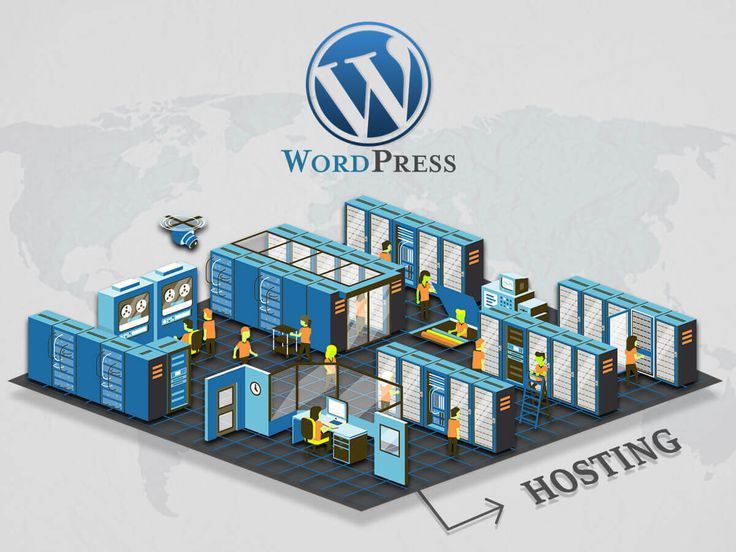In the vast realm of the internet, having a reliable web hosting service is vital for any website, particularly for WordPress sites. WordPress is one of the most popular content management systems globally, powering over 40% of all websites. However, to harness the full potential of WordPress, it’s essential to select the right web hosting solution. This comprehensive guide will delve into everything you need to know about web hosting for WordPress, including types of hosting, key features to consider, and the best providers available.
Understanding Web Hosting for WordPress
What is Web Hosting?
Web hosting is a service that allows individuals and organizations to make their website accessible on the internet. It involves storing website files on a server, which is connected to the internet, allowing users to access your site via a domain name. For WordPress sites, web hosting is particularly important as it can significantly impact performance, security, and overall user experience.
Why WordPress-Specific Hosting?
While you can host a WordPress site on any server, choosing a hosting provider that specializes in WordPress comes with numerous benefits. WordPress-specific hosting is optimized for WordPress sites, ensuring better performance, higher security, and more seamless updates. Additionally, many WordPress hosting providers offer features that cater specifically to WordPress users, such as one-click installations, automatic updates, and tailored customer support.
Types of Web Hosting for WordPress
When it comes to web hosting for WordPress, there are several types of hosting solutions available. Each type has its advantages and disadvantages, so understanding them can help you make an informed decision.
1. Shared Hosting
Overview: Shared hosting is one of the most affordable options available, making it a popular choice for beginners and small websites. In shared hosting, multiple websites share the same server resources.Pros:
- Low cost: This is the most economical hosting option, often starting as low as $2 to $10 per month.
- User-friendly: Most shared hosting providers offer easy-to-use control panels and one-click WordPress installations.
- Good for low traffic: Ideal for personal blogs or small business sites with moderate traffic.
Cons:
- Limited resources: Since resources are shared, performance can slow down if other sites on the server consume excessive bandwidth.
- Security risks: Shared hosting can pose security threats, as vulnerabilities in one site can potentially affect others sharing the same server.
Best For: Beginners, personal blogs, and small businesses with low to moderate traffic.
2. Virtual Private Server (VPS) Hosting
Overview: VPS hosting provides a middle ground between shared hosting and dedicated hosting. In VPS hosting, a physical server is divided into multiple virtual servers, each allocated its resources.Pros:
- Dedicated resources: Each VPS has its own allocated resources, leading to better performance and stability.
- Increased control: Users have more control over their server environment, including the ability to install custom software.
- Enhanced security: VPS hosting is generally more secure than shared hosting since users operate in isolated environments.
Cons:
- Higher cost: VPS hosting is more expensive than shared hosting, typically ranging from $20 to $100 per month.
- Technical knowledge required: Users need some technical expertise to manage their VPS effectively.
Best For: Growing websites, e-commerce sites, and businesses with moderate traffic and resource needs.
3. Managed WordPress Hosting
Overview: Managed WordPress hosting is a specialized hosting service that takes care of all technical aspects of running WordPress, allowing users to focus on creating content.Pros:
- Optimized performance: Managed hosting providers optimize their servers specifically for WordPress, ensuring faster loading times.
- Automatic updates: Providers handle WordPress core updates, theme updates, and plugin updates, reducing security risks.
- Enhanced security: Managed hosting typically includes robust security features, including firewalls, malware scanning, and daily backups.
Cons:
- Higher cost: Managed WordPress hosting can be more expensive than other types of hosting, often starting at $30 per month.
- Limited flexibility: Some managed hosts restrict certain plugins or customizations to maintain performance and security.
Best For: Bloggers, businesses, and agencies looking for hassle-free WordPress management.
4. Dedicated Hosting
Overview: Dedicated hosting involves renting an entire server exclusively for your website. This type of hosting is best suited for large websites that require significant resources.Pros:
- Complete control: Users have full control over the server environment, including hardware, operating system, and software.
- High performance: Dedicated hosting delivers exceptional performance, speed, and reliability due to dedicated resources.
- Enhanced security: With no other sites on the server, dedicated hosting offers a higher level of security.
Cons:
- High cost: Dedicated hosting is the most expensive option, often starting at $100 per month and going up significantly based on server specifications.
- Technical expertise required: Users need a good understanding of server management to configure and maintain dedicated servers.
Best For: Large businesses, high-traffic websites, and resource-intensive applications.
Key Features to Consider When Choosing Web Hosting for WordPress
Selecting the right web hosting provider for your WordPress site involves evaluating several key features. Here are some of the most important factors to consider:
1. Performance and Uptime
Website performance and uptime are critical components of a successful online presence. A reliable hosting provider should guarantee at least 99.9% uptime, ensuring your site is accessible to users at all times. Additionally, look for hosts that utilize SSD storage and Content Delivery Networks (CDNs) to enhance loading speeds.
2. Security Features
Security is paramount when it comes to web hosting. A good hosting provider should offer robust security measures, including:
- Free SSL Certificate: An SSL certificate encrypts data transmitted between your website and its visitors, enhancing security.
- Regular Backups: Automated backups ensure that your website can be restored quickly in case of data loss or hacking attempts.
- Malware Protection: Choose a host that offers proactive malware scanning and removal services.
3. Customer Support
Reliable customer support is invaluable, especially for beginners or those unfamiliar with WordPress. Look for hosting providers that offer 24/7 support through multiple channels such as live chat, email, and phone. User reviews can help you gauge the quality of customer support before making a decision.
4. User-Friendly Interface
A user-friendly control panel can simplify website management tasks. Most hosting providers should offer intuitive dashboards that make it easy to manage your WordPress site, set up email accounts, and monitor performance.
5. Pricing and Plans
Consider your budget when selecting a hosting provider. Many hosts offer competitive pricing, but be cautious of hidden fees and renewal rates. Look for providers that offer clear pricing structures and money-back guarantees, allowing you to test their services risk-free.
6. Scalability
As your website grows, your hosting needs may change. Choose a hosting provider that offers scalable plans, allowing you to upgrade or downgrade resources without the hassle of migrating to a new host.
Best Web Hosting Providers for WordPress
Now that we’ve outlined the key features to consider, let’s explore some of the best web hosting providers for WordPress available today.
1. Bluehost
Overview: Bluehost is one of the most popular hosting providers recommended by WordPress.org. Known for its affordability and user-friendly features, it’s an excellent choice for beginners.Starting Price: $2.95/month (initial term)Key Features:
- One-click WordPress installation
- Free domain for the first year
- 24/7 customer support
- Free SSL certificate
Pros:
- Easy-to-use control panel
- High uptime guarantee (99.9%)
- Comprehensive knowledge base for self-help
Cons:
- Higher renewal rates
- Limited storage on basic plans
User Case: Sarah, a new blogger, chose Bluehost to launch her cooking blog. She appreciated the one-click installation process and the responsive customer support, which allowed her to focus on sharing her recipes rather than dealing with technical issues.
2. SiteGround
Overview: SiteGround is renowned for its exceptional customer service and high-performance hosting solutions. As another hosting provider recommended by WordPress.org, it is particularly well-suited for managed WordPress hosting.Starting Price: $3.99/month (initial term)Key Features:
- Managed WordPress hosting with automatic updates
- Free daily backups
- High-speed performance with SSD storage
- Enhanced security measures
Pros:
- Excellent customer support
- Free website migration service
- Strong uptime and performance metrics
Cons:
- Higher starting prices compared to some competitors
- Limited storage on basic plans
User Case: John, a small business owner, opted for SiteGround to host his e-commerce store. He found the managed features beneficial, allowing him to focus on growing his business without worrying about technical maintenance.
3. A2 Hosting
Overview: A2 Hosting is known for its speed and performance, offering a range of hosting plans tailored to different user needs. With a focus on high-speed performance, A2 Hosting positions itself as an ideal choice for users looking for optimized hosting solutions.Starting Price: $2.99/month (initial term)Key Features:
- Turbo servers for enhanced speed (available at higher tiers)
- Free SSL certificate and site migration
- Developer-friendly features
Pros:
- High-performance Turbo plans
- Great customer support
- 99.9% uptime guarantee
Cons:
- Turbo plans can be pricey
- Average renewal rates
User Case: Mark, a freelance web developer, turned to A2 Hosting for his portfolio website. He found the speed enhancements invaluable, as they impressed clients and improved
4. DreamHost
Overview: DreamHost is an established hosting provider known for its commitment to privacy and strong security measures. It offers a range of hosting solutions, including shared, managed, and cloud hosting.Starting Price: $2.59/month (initial term)Key Features:
- Free domain registration for the first year
- Automated daily backups
- Unlimited bandwidth on shared plans
Pros:
- Strong focus on user privacy and security
- 97-day money-back guarantee
- Comprehensive customer support
Cons:
- No cPanel, which may confuse some users
- Higher pricing for monthly plans
User Case: Emily, a nonprofit director, chose DreamHost for her organization’s website. She appreciated the focus on security and privacy, which aligned perfectly with her mission to protect sensitive donor information.
5. Hostinger
Overview: Hostinger has gained popularity for its incredibly low pricing and reliable performance. It offers a variety of hosting options tailored for different user needs, including shared and cloud hosting.Starting Price: $1.39/month (initial term)Key Features:
- Free SSL and domain name
- User-friendly hPanel for easy website management
- 24/7 customer support
Pros:
- Extremely competitive pricing
- Fast performance with LiteSpeed servers
- Good uptime reliability
Cons:
- Some advanced features may require technical knowledge
- Limited resources on basic plans
User Case: Alex, a college student and part-time blogger, chose Hostinger for his lifestyle blog. He appreciated the affordability and ease of use, allowing him to focus on content creation without significant financial strain.
Best Practices for Optimizing Your WordPress Hosting Experience
Once you’ve chosen the right hosting provider for your WordPress site, implementing best practices can help you optimize its performance and security. Here are some essential tips:
1. Regular Backups
Even with a reliable hosting provider, it’s vital to have a backup plan in place. Many affordable hosting providers offer automated backups, but consider supplementing these with a dedicated backup plugin like UpdraftPlus or BackupBuddy. Schedule regular backups to safeguard your data against unforeseen issues such as server crashes or hacking attempts.
2. Keep WordPress Updated
Regularly updating your WordPress core, themes, and plugins is crucial for optimal security and performance. Most providers offer automatic updates, but it’s a good practice to check for updates manually, especially after significant releases. Keeping your software up to date can help prevent vulnerabilities that hackers might exploit.
3. Optimize Your Website
To maintain good performance, regularly optimize your website by:
- Compressing Images: Use tools like TinyPNG or Smush to reduce the size of your images without sacrificing quality. This can significantly speed up loading times.
- Implementing Caching: Caching plugins such as W3 Total Cache or WP Super Cache store static versions of your website, resulting in faster loading speeds and improved user experience.
- Cleaning Up Your Database: Use optimization plugins to remove unnecessary data, such as post revisions and spam comments, which can bloat your database and slow down your site.
4. Monitor Website Performance
Utilizing tools like Google PageSpeed Insights or GTmetrix can help you monitor your website’s performance. These tools provide insights into loading speeds and suggest improvements to enhance user experience and SEO rankings. Regularly checking your site’s performance can help identify issues before they affect your visitors negatively.
5. Engage with Your Audience
Regularly updating your content and engaging with your audience through blog posts, newsletters, and social media is essential. Fresh and relevant content not only improves your SEO but also boosts user engagement, encouraging visitors to return and explore new offerings. Additionally, consider implementing a blog or resource section on your site to share valuable information related to your niche.
6. Leverage Social Media
Promoting your content on social media platforms can drive traffic to your website. Share your blog posts, engage with followers, and participate in relevant conversations to increase your online presence. Social media is a powerful tool for building relationships with your audience and expanding your reach.
7. Set Up a Content Schedule
Creating a content calendar helps you plan your posts in advance, ensuring you consistently publish fresh content. This practice not only helps with SEO but also keeps your audience engaged and coming back for more. Regularly scheduled content can improve your website’s authority and visibility in search results.
8. Analyze and Adapt
Utilize analytics tools like Google Analytics to track your website’s performance and understand user behavior. Pay attention to metrics like bounce rates, average session duration, and traffic sources. This data can help you identify what works and what needs improvement, allowing you to adapt your strategies accordingly.
Common Challenges with Web Hosting for WordPress
While web hosting for WordPress offers numerous benefits, it also comes with certain challenges. Understanding these challenges can help you navigate them effectively.
1. Limited Resources
Some low-cost hosting plans may come with limited resources, such as bandwidth and storage. If your website experiences unexpected traffic spikes, you may encounter performance issues. It’s important to monitor your usage and be prepared to upgrade if needed.
2. Higher Renewal Rates
Many hosting providers offer attractive introductory prices that increase significantly upon renewal. Be sure to factor in these potential costs when budgeting for your website. Look for hosting providers that maintain consistent pricing or offer loyalty discounts to mitigate this issue.
3. Compatibility with Plugins and Themes
While most hosting providers support WordPress, compatibility issues can arise with certain plugins and themes. Before committing, check if the host has any known issues with the tools you plan to use. Some hosts may also have restrictions on specific plugins due to resource limitations or security concerns.
4. Learning Curve
If you are new to WordPress, there may be a learning curve when it comes to managing your hosting account and website. While many providers offer user-friendly dashboards, you may still need to familiarize yourself with the platform. Take advantage of tutorials and resources provided by the hosting company to ease the transition.
5. Potential Downtime
While reputable hosting providers guarantee high uptime rates, occasional downtime can occur due to maintenance or technical issues. It’s wise to review the host’s uptime history and understand their policies regarding downtime. Many hosts offer compensation for significant downtime, but it’s essential to know what to expect.
Conclusion
In conclusion, choosing the right web hosting for WordPress is a critical decision that can significantly influence your website’s performance, security, and user experience. With various hosting options available—including shared, VPS, managed, and dedicated hosting—it’s essential to assess your specific needs and budget before making a choice.By understanding the key features to look for in a hosting provider, such as performance, security, customer support, and scalability, you can make an informed decision that aligns with your goals. The best web hosting providers for WordPress, including Bluehost, SiteGround, A2 Hosting, DreamHost, and Hostinger, offer various plans to suit different users and budgets.Once you select the right hosting provider, follow best practices to optimize your WordPress site, including regular backups, software updates, and performance monitoring. While challenges may arise, being proactive and informed will help you navigate them effectively.With the right web hosting solution, you can create a successful WordPress site that engages your audience, drives traffic, and achieves your online goals. Whether you’re a blogger, business owner, or creative professional, investing in quality web hosting for WordPress is a vital step toward your success in the digital landscape.




